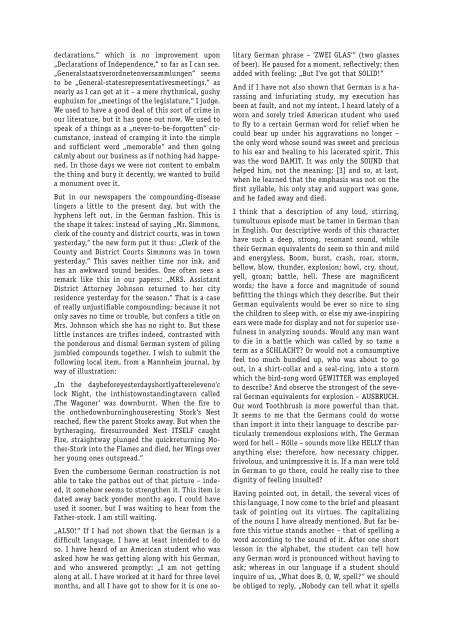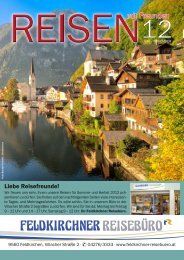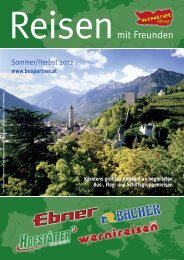The Awful German Language by Mark Twain.indd - BERGER
The Awful German Language by Mark Twain.indd - BERGER
The Awful German Language by Mark Twain.indd - BERGER
You also want an ePaper? Increase the reach of your titles
YUMPU automatically turns print PDFs into web optimized ePapers that Google loves.
declarations,“ which is no improvement upon<br />
„Declarations of Independence,“ so far as I can see.<br />
„Generalstaatsverordnetenversammlungen“ seems<br />
to be „General-statesrepresentativesmeetings,“ as<br />
nearly as I can get at it – a mere rhythmical, gushy<br />
euphuism for „meetings of the legislature,“ I judge.<br />
We used to have a good deal of this sort of crime in<br />
our literature, but it has gone out now. We used to<br />
speak of a things as a „never-to-be-forgotten“ circumstance,<br />
instead of cramping it into the simple<br />
and suffi cient word „memorable“ and then going<br />
calmly about our business as if nothing had happened.<br />
In those days we were not content to embalm<br />
the thing and bury it decently, we wanted to build<br />
a monument over it.<br />
But in our newspapers the compounding-disease<br />
lingers a little to the present day, but with the<br />
hyphens left out, in the <strong>German</strong> fashion. This is<br />
the shape it takes: instead of saying „Mr. Simmons,<br />
clerk of the county and district courts, was in town<br />
yesterday,“ the new form put it thus: „Clerk of the<br />
County and District Courts Simmons was in town<br />
yesterday.“ This saves neither time nor ink, and<br />
has an awkward sound besides. One often sees a<br />
remark like this in our papers: „MRS. Assistant<br />
District Attorney Johnson returned to her city<br />
residence yesterday for the season.“ That is a case<br />
of really unjustifi able compounding; because it not<br />
only saves no time or trouble, but confers a title on<br />
Mrs. Johnson which she has no right to. But these<br />
little instances are trifl es indeed, contrasted with<br />
the ponderous and dismal <strong>German</strong> system of piling<br />
jumbled compounds together. I wish to submit the<br />
following local item, from a Mannheim journal, <strong>by</strong><br />
way of illustration:<br />
„In the daybeforeyesterdayshortlyaftereleveno‘c<br />
lock Night, the inthistownstandingtavern called<br />
‚<strong>The</strong> Wagoner‘ was downburnt. When the fi re to<br />
the onthedownburninghouseresting Stork‘s Nest<br />
reached, fl ew the parent Storks away. But when the<br />
<strong>by</strong>theraging, fi resurrounded Nest ITSELF caught<br />
Fire, straightway plunged the quickreturning Mother-Stork<br />
into the Flames and died, her Wings over<br />
her young ones outspread.“<br />
Even the cumbersome <strong>German</strong> construction is not<br />
able to take the pathos out of that picture – indeed,<br />
it somehow seems to strengthen it. This item is<br />
dated away back yonder months ago. I could have<br />
used it sooner, but I was waiting to hear from the<br />
Father-stork. I am still waiting.<br />
„ALSO!“ If I had not shown that the <strong>German</strong> is a<br />
diffi cult language, I have at least intended to do<br />
so. I have heard of an American student who was<br />
asked how he was getting along with his <strong>German</strong>,<br />
and who answered promptly: „I am not getting<br />
along at all. I have worked at it hard for three level<br />
months, and all I have got to show for it is one so-<br />
litary <strong>German</strong> phrase – ‘ZWEI GLAS‘“ (two glasses<br />
of beer). He paused for a moment, refl ectively; then<br />
added with feeling: „But I‘ve got that SOLID!“<br />
And if I have not also shown that <strong>German</strong> is a harassing<br />
and infuriating study, my execution has<br />
been at fault, and not my intent. I heard lately of a<br />
worn and sorely tried American student who used<br />
to fl y to a certain <strong>German</strong> word for relief when he<br />
could bear up under his aggravations no longer –<br />
the only word whose sound was sweet and precious<br />
to his ear and healing to his lacerated spirit. This<br />
was the word DAMIT. It was only the SOUND that<br />
helped him, not the meaning; [3] and so, at last,<br />
when he learned that the emphasis was not on the<br />
fi rst syllable, his only stay and support was gone,<br />
and he faded away and died.<br />
I think that a description of any loud, stirring,<br />
tumultuous episode must be tamer in <strong>German</strong> than<br />
in English. Our descriptive words of this character<br />
have such a deep, strong, resonant sound, while<br />
their <strong>German</strong> equivalents do seem so thin and mild<br />
and energyless. Boom, burst, crash, roar, storm,<br />
bellow, blow, thunder, explosion; howl, cry, shout,<br />
yell, groan; battle, hell. <strong>The</strong>se are magnifi cent<br />
words; the have a force and magnitude of sound<br />
befi tting the things which they describe. But their<br />
<strong>German</strong> equivalents would be ever so nice to sing<br />
the children to sleep with, or else my awe-inspiring<br />
ears were made for display and not for superior usefulness<br />
in analyzing sounds. Would any man want<br />
to die in a battle which was called <strong>by</strong> so tame a<br />
term as a SCHLACHT? Or would not a comsumptive<br />
feel too much bundled up, who was about to go<br />
out, in a shirt-collar and a seal-ring, into a storm<br />
which the bird-song word GEWITTER was employed<br />
to describe? And observe the strongest of the several<br />
<strong>German</strong> equivalents for explosion – AUSBRUCH.<br />
Our word Toothbrush is more powerful than that.<br />
It seems to me that the <strong>German</strong>s could do worse<br />
than import it into their language to describe particularly<br />
tremendous explosions with. <strong>The</strong> <strong>German</strong><br />
word for hell – Hölle – sounds more like HELLY than<br />
anything else; therefore, how necessary chipper,<br />
frivolous, and unimpressive it is. If a man were told<br />
in <strong>German</strong> to go there, could he really rise to thee<br />
dignity of feeling insulted?<br />
Having pointed out, in detail, the several vices of<br />
this language, I now come to the brief and pleasant<br />
task of pointing out its virtues. <strong>The</strong> capitalizing<br />
of the nouns I have already mentioned. But far before<br />
this virtue stands another – that of spelling a<br />
word according to the sound of it. After one short<br />
lesson in the alphabet, the student can tell how<br />
any <strong>German</strong> word is pronounced without having to<br />
ask; whereas in our language if a student should<br />
inquire of us, „What does B, O, W, spell?“ we should<br />
be obliged to reply, „Nobody can tell what it spells







